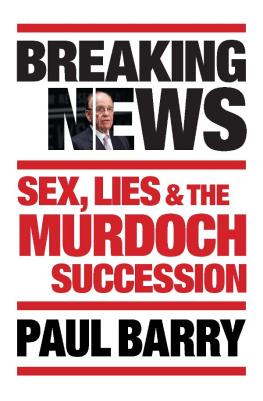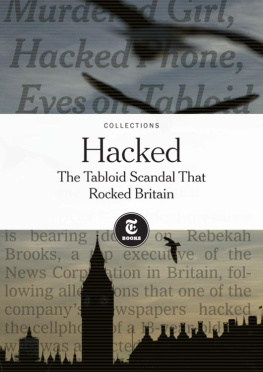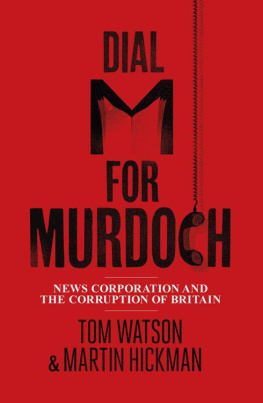Acknowledgements
In the course of this project, I received support and encouragement from many people and institutions. I am grateful to the two universities at which I worked during my research: the University of Technology, Sydney and the University of New South Wales. Good libraries are necessary in order to write substantial books, and I thank the staff at Fisher Library, University of Sydney, and the library of the University of New South Wales. Staff at the Library of Congress in Washington, the Butler Library at Columbia University in New York and the BBC library in London were also very helpful. Much of the original research for this book was funded by a Discovery Project grant (DP0774025) from Australias national research funding body, the Australian Research Council, for which I am grateful.
In particular, I would like to thank Jane Mills for her wise advice and support, as well as Rod Tiffen, Elizabeth Weiss, Peter Botsman, Penny Mansley and Julie Clarke. For research support, thanks to Bob Burton, Shant Fabricatorian, John Fisher, Madelaine Healy, Mitchell Hobbs, Craig Maclean, David Smith and Alex Stuart. I would particularly like to record my deep appreciation for assistance from the late Cathy Carey. For interviews, advice or other support, thanks to Roger Alton, Steve Barnett, Neil Chenoweth, Chris Fogg, Gerard Goggin, Murray Goot, Chris Hird, Godfrey Hodgson, Mark Hollingsworth, Joyce Kirk, Phillip Knightly, Rod Lever, Catharine Lumby, Brian MacArthur, Brian McNair, Denis MacShane, Robert Manne, Patrick Masters, Adrian Monck, Richard Neville, Penny ODonnell, Bruce Page, Robin Ramsay, Matthew Ricketson, David Rowe, Lindsay Tuffin, Sean Tunney and Graeme Turner. I would also like to thank the many people who have worked for News Corporation and who helped me but who prefer to retain their anonymity here.
Crusading Corporation
I think what people dont understand about me is that Im not just a businessman working in a very interesting industry. I am someone whos interested in ideas.
Rupert Murdoch, 1995
For better or worse [my company] is a reflection of my thinking, my character, my values.
Rupert Murdoch, 1996
The 2004 convention of the Republican Party, held in New Yorks Madison Square Garden, was a triumph for President George W. Bush. Still lauded by many at the time as the hero of the Iraq war, Bush defeated John Kerry for the presidency later that year. At the end of the convention, as most delegates were leaving their seats, a revealing incident occurred. At CNNs floor set, where hosts Judy Woodruff and Wolf Blitzer were conducting interviews, some delegates began chanting, Watch Fox News! Watch Fox News! They saw Fox News as their friend and CNN as the enemy in their midst.
CNN once infuriated Rupert Murdoch. During his daily ride on his exercise bike, he used to frown at the successful news network and dream of building a television news operation to rival what he called the liberal and left-leaning CNN. Today, CNNs rival flourishes and consistently beats it in the ratings war. Murdochs Fox News is a powerful persuader in US politics, credited not only with influencing its loyal audience but with affecting the tone of all US television, an influence summed up by the term the Fox News effect. Its shouting heads broadcast a nightly mantra of fear-filled messages to their three million viewers. Its swirling graphics and dramatic music intensify its Fox News Alerts about the latest threat from terrorists, liberals, gaysand Democrats.
President Barack Obama has been a particular target. When he was running for the Democratic nomination in 2007, Fox News commentators rushed to air a false report that as a child growing up in Indonesia Obama had been educated at an Islamic school, a madrasah. In the postSeptember 11 United States, an association with a madrasah was likely to prompt suggestions of an association with Islamic terrorism. Later, during the presidential campaign, one Fox commentator flippantly suggested that Barack and his wife, Michelle Obama, had greeted each other with a terrorist fist jab. The commentator later apologised, as did another Fox commentator who had joked about assassinating Obama and Osama bin Laden after supposedly muddling their names. Throughout the campaign, one of Fox News belligerent hosts, Sean Hannity, nightly attacked Obama for being an arrogant elitist and suggested that he had been a friend of terrorists and black radicals, echoing pro-Republican attack advertisements. Obama referred to these as rants from Sean Hannity and was particularly upset by the attacks on his wife.
In the middle of the campaign, Rupert Murdoch met Obama, along with Fox News chief Roger Ailes. Obama sought common ground with Murdoch, asking about his relationship with his father (the subject of Obamas Dreams of My Father ), but to Ailes he said that he didnt want to waste time talking if Fox was going to keep attacking him and his wife, relentlessly portraying him
Murdoch had another, less direct, connection to the Republican campaign for the presidency that year. One of his editors discovered Sarah Palin, promoted her as a rising Republican star and then supported her when she became the vice-presidential candidate beside John McCain. Bill Kristol, editor of the Weekly Standard , Murdochs insiders magazine, visited Alaska on a cruise ship along with other leading US conservatives. He met Palin, who was the Republican governor of Alaska, and later Kristols neo-conservative Standard described her shining victory as governor while the rest of the Republican Party was demoralised.
As it turned out, Fox News support for the McCainPalin ticket and its relentless hostility to Obama were not enough to hold back the tidal wave of support for the Democrat candidate. But this was just the beginning. To mix a metaphor, Fox didnt change its spots. Obamas victory lifted the hopes of many Americans but deeply troubled many conservatives, who saw their chance to fight back when Obama increased government spending to cope with the worst financial crisis in 80 years. Within a few months of his inauguration a new political phenomenon was born, the Tea Party, which attacked the spending and tax increases needed to deal with the global crisis. For the first time in many years, conservative political action took the form of angry street protests. Fox News leaped on this: its talk show hosts urged their audiences to support the rallies, its website gave details of the locations and times of the events. A particular devotee of the street protests was Fox News host Glenn Beck, whose incendiary remarks accusing Obama of being a racist with a deep-seated hatred of white people or the white culture shocked many. In the weeks before the first major Tea Party rallies in April 2009, Fox News promoted them aggressively, urging viewers to vent your anger. At the rallies, several high-profile hosts, including Sean Hannity, Neil Cavuto and Greta Van Susteren as well as Beck, gave live coverage. (Murdochs New York Post also backed the anti-Obama tea parties right from the start and listed the times and locations of the rallies.)
The White House was rattled by the Tea Party rallies and described Fox News as a wing of the Republican Party. Obamas spokeswoman Anita Dunn said that when Obama appeared on Fox he understood that it is really not a news network at this point. A few days later, Murdoch responded by saying that the Obama administration had a reputation for being anti-business. He was smug about the attacks on Fox: Strong remarks have been coming out of the White House about one or two commentators on Fox News. All I can tell you is that its greatly increased their ratings.
Fox News consciously manipulated the language of political debate once Obama was in power. When his health package was being discussed, a senior Fox executive sent a friendly reminder to staff urging them to use the term government-run health insurance and to avoid the term the public option. If the latter phrase had to be used, it was better to refer to it as the so-called public In similar fashion, the New York Post and the Wall Street Journal routinely referred to government-run health care and the so-called public option. This coincided precisely with advice given by Republican strategists to their party.
Next page
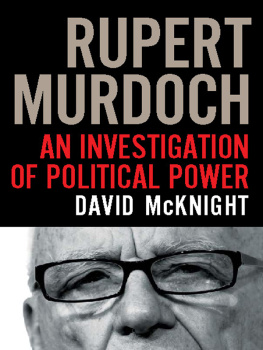

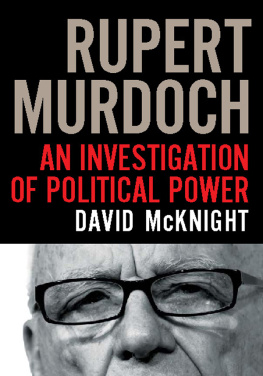
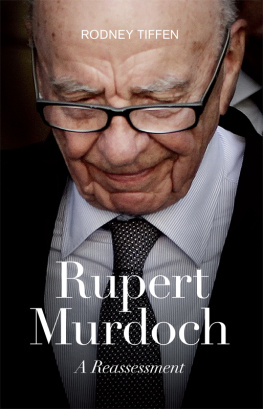
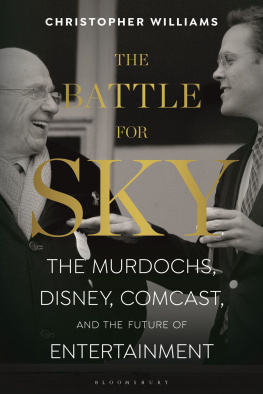
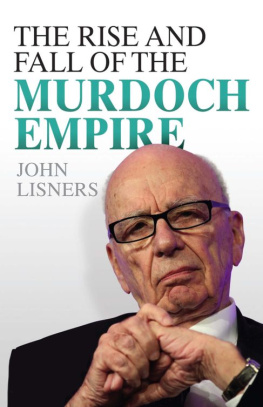
![Greenwald Robert - Outfoxed : [Rupert Murdochs war on journalism]](/uploads/posts/book/99754/thumbs/greenwald-robert-outfoxed-rupert-murdoch-s-war.jpg)
